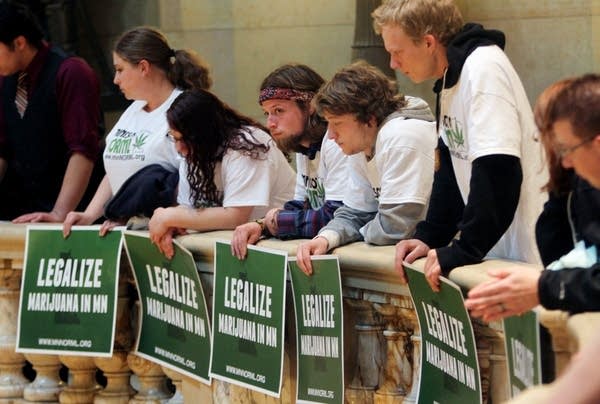Independence Party candidates roll marijuana into their future

Go Deeper.
Create an account or log in to save stories.
Like this?
Thanks for liking this story! We have added it to a list of your favorite stories.
The Independence Party of Minnesota will try to remain a major party this year, largely with young candidates who are politically inexperienced and favor legalizing marijuana.
Marijuana played a role in the party's recruitment of Brandan Borgos, the Independence Party's endorsed candidate for attorney general. He said party officials asked him to run for office and a factor in their consideration was his work as a board member for Minnesota NORML, the organization that lobbies for legalized marijuana.
"They wanted, in my opinion, to send a very, very strong message," said Borgos, 32. "With the amount of people in the state who want some form of marijuana reform, they wanted to bring in someone who has a very, very good amount of information behind him, and then an organization too, that frankly is one of the biggest state chapters of the national organization."
Other Independence Party candidates also are talking about reasons to legalize marijuana.
Turn Up Your Support
MPR News helps you turn down the noise and build shared understanding. Turn up your support for this public resource and keep trusted journalism accessible to all.
"Marijuana is producing a lot of revenue for Colorado right now," said John Denney, a 28-year-old law school student who is running for congress in the Sixth District. "If you want to see more revenue in this state, that's one really strong reason to look at legalizing marijuana, if you ask me."
Denny said the war on drugs should be ended. Hannah Nicollet, the IP candidate for governor, agreed. She thinks too many people are in jail for using marijuana or other drugs — a problem the IP addresses by including the full legalization of marijuana in its platform.

"Putting nonviolent people in cages is a detriment to society, and giving people a criminal record when it makes it harder to get a job and it doesn't help them," Nicollet said. "Even if somebody is an addict, something that's really destructive, like somebody is a meth addict, I don't see how giving them a criminal record helps that addict in any way. It should be treated as a social problem, not a criminal problem."
Nicollet, 39, supported Republican Ron Paul's presidential campaign two years ago and planned to run for the U.S. Senate before switching to the governor's race. Her political resume pales in comparison to the IP's previous three candidates for governor: former U.S. Rep. Tim Penny in 2002, Peter Hutchinson, a former state commissioner under the Perpich administration, in 2006 and former Republican Party strategist Tom Horner in 2010.
Horner said he does not yet know enough about Nicollet to comment on her candidacy. But he's pleased to see more young people getting involved with the party that he still advises. On the marijuana issue, Horner has mixed feelings.
"I think it's going to be an issue that probably on the whole is going to be a plus for the Independence Party," Horner said. "But looking long term, I don't think the Independence Party is going to be successful if it is defined too narrowly around any single issue, even one that is as emotional and as volatile as marijuana."

Independence Party Chairman Mark Jenkins said he doesn't think marijuana is a defining issue for the party or its candidates. He stressed that they remain rooted in the fiscally-conservative, socially-tolerant philosophy that Horner and other previous candidates ran on.
"No one on our team, even Brandan, is running on marijuana as a sole issue," Jenkins said. "In fact, I'll be surprised if it becomes much of an issue at all in the election, because Minnesota is more than just a plant."
Still, Jenkins insists that the party was changed for the better by its decision in 2013 to support in its platform the legalization, taxation and regulation of marijuana.
"When I came on as chair over three years ago, the party was afraid to takes stances on major issues, because the delegates felt that it might scare away candidates," he said. "When I came in I said we have to take stands on issues to attract candidates."
To retain major-party status, the IP needs one of its statewide candidates to win at least 5 percent of the vote in this year's general election. Jenkins said he's not concerned about meeting that threshold.



